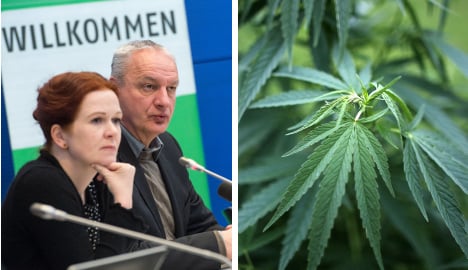“Until now the debate has been based on few hard facts and more vague feelings,” Green drugs policy spokesman and MP Harald Terpe told The Local.
“Now there's a draft law for people to explain why they're for or against it, not just the question of whether there should even be one.”
Terpe argues that the international climate, which has seen several countries reduce or eliminate criminal penalties for possession and use of the drug, means that now is the right time to push for legalization.
Tight controls for legal cannabis
At a press conference in Berlin, Katja Dörner, deputy Green leader in the Bundestag (German parliament), told journalists that the “cannabis control law” would create a system that protected children and young people while decriminalizing adults.
People growing or selling cannabis would be “strictly monitored”, she said, with imports tightly restricted, no distance selling or use of vending machines and no advertising allowed.
“We want to address people's fears, especially parents',” Terpe said. “We want to protect young people, who are in worse danger while there is a black market.”
This being the Green party, the law also includes provisions forbidding the sale of cannabis from genetically modified plants, or any treated with pesticides or other chemicals.
The Greens reckon that a tax of €6-7 per gram of cannabis could also bring in €1-2 billion per year to state coffers, based on current average street prices of €10-12 per gram.
They also hope that their plan will massively reduce the burden on the police and judiciary.
“The prohibitive policy against illegal drugs has failed,” Terpe said. “It criminalizes people over trivial crimes.”
Green politicians have long advocated for legalizing consumption of cannabis, with party leader Cem Özdemir last year appearing with a hemp plant in an 'ice bucket challenge' video.
Slim prospects of becoming law
Pro-legalization campaigners welcomed the Green party's move, although they said that it was unlikely to succeed.
“Politicians are definitely not ready for it, both CDU [Christian Democratic Union] and SPD [Social Democratic Party] will vote against it,” Georg Wurth of the German Hemp Federation (DHV) told The Local.
Germany's two largest parties, currently governing together in a 'grand coalition' of centre-left and centre-right, are unlikely to leapfrog public opinion.
A November poll by infratest dimap on behalf of the DHV showed that only 30 percent of people believed cannabis should be made completely legal, although 80 percent were in favour of legalizing cannabis as a medicine.
Wurth argued that despite the polls, the Greens were taking an important step forward with their proposal.
“It's a worthwhile contribution to the discussion, it's a milestone in the debate as the first detailed draft law,” Wurth said.
“I think more and more that we're not discussing so much whether cannabis will be legalized as when,” he added.
'Basically legal as a medicine'
Wurth pointed out that just as in the USA in the years leading up to legalization in some states, cannabis is now “basically legal as a medicine in Germany, although it's treated very restrictively.”
Figures released on Wednesday by the Federl Institute for Medicines and Medical Products (BfArM) showed that 382 Germans are currently legally taking cannabis as a painkiller.
A total of 424 licenses have been granted for doctor-supervised medical use of cannabis since a 2005 Supreme Court decision, although 42 of those patients have since died.



 Please whitelist us to continue reading.
Please whitelist us to continue reading.
Member comments